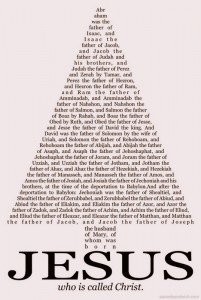 It was way back when I first noticed that if you translated the names of Jesus’ ancestors you got descriptions that sounded very much like his earthly life. I first spotted it in the names from Shem to Abram, for instance my concordance listed the name “Arpachsad” as meaning “healer” or “releaser” and “Reu” as meaning a “friend” but noting that it was also the relationship between a shepherd and the sheep. But it wasn’t until the internet came along that I could properly research names… and when I did I found out I wasn’t the only one with a hunch on this. Together people where discovering whole prophetic phrases in the list of names in Jesus’ genealogy.
It was way back when I first noticed that if you translated the names of Jesus’ ancestors you got descriptions that sounded very much like his earthly life. I first spotted it in the names from Shem to Abram, for instance my concordance listed the name “Arpachsad” as meaning “healer” or “releaser” and “Reu” as meaning a “friend” but noting that it was also the relationship between a shepherd and the sheep. But it wasn’t until the internet came along that I could properly research names… and when I did I found out I wasn’t the only one with a hunch on this. Together people where discovering whole prophetic phrases in the list of names in Jesus’ genealogy.
As time has gone by certain standard interpretations have emerged, but in my opinion, they where not always the best neither where they all focused on Jesus. And most where simply published without background comment. So I felt I should add my own contribution to the discussion.
I will publish my thoughts in a series of shorter posts. Each one just focusing on a few names at a time so we can think about multiple possibilities as well as giving my preferred readings.
So let’s start with the names From God to Kenan, just three generations on from Adam. As we will see, these names beautifully describe God’s breaking in to human history, complete with the social context he would be born in!
Tracing Jesus genealogy either from Genesis or from Luke 3, the first name in the list is:
God/Elohim
Elohim is the plural form of the noun Eloah from which Arabic gets the name Allah! But while the noun is plural it is used with singular verbs when used of God. God is clearly a unity, put with multiple aspects. I sometime translate Elohim as Multi-God or Manifold-God.
Adam
At a simple level Adam simply means “man“. The Hebrew word “אדם” also means “red” in fact the “דם” part is the Hebrew word for blood… but Adam of course wasn’t Hebrew… and here we find an interesting possibility… you see in the oldest language we know anything about is Akkadian, and Akkadian used “Adamu” as the name of the first man. In Akkadian “adamu” is a verb meaning to make, produce or build, As a noun/name it would mean “maker”/”producer” or “builder“, all of which are relevant.
- Maker: Adam is made in the image of his maker…
- Producer: The first Adam was a gardener, a producer
- Builder: The second Adam, Jesus, was a “τεκτων”/”tekton” which is literally “a builder” though it has come into English as “carpenter”.
Seth
Seth simply means “is appointed“, while the word is part of a cluster of meanings, which can include things such as being “laid waste to”, Eve explains the name so we can ignore these other possibilities.
Enosh
Enosh meaning “failing” as in dying, so is often translated as “mortal” or even “mortal man”.
Kenan
Here we have two possibilities, some translators see the name “קינן” as en extension of “Cain”/”קין” which means “begotten“, (literally “acquired” but in the sense of being born) but others see a connection to the verb “qyn”/”קין” which means “to make a lament” as in grieving or being sorrowful.
So putting it together
When I find two possible options work in creating a prophetic statement I tend to include both, after all it is hardly beyond the wit of the Holy Spirit to have inspired the names to be recorded in ways that have multiple meanings and a manifold-God will have manifold wisdom!
So we get:
Manifold-God, a man/builder is appointed; mortal, begotten/sorrowful.
or if we tidy up the English, we might say something like:
Manifold-God the builder is appointed mortal, born in sorrow.
Notice how Jesus was born in a small village in which his wider family had gathered for the census, when Herod killed the children, people known and remembered by Jesus’ family would have paid the price for God’s birth as a mortal man, he was begotten in sorrow. Then as he grew as a young apprentice builder/carpenter, Jesus would have worked in Sepphoris, the new Roman city being built three miles north of Nazareth, as a teenager the Romans crucified 2000 of Jesus contemporaries in that city for a rebellion, Jesus knew the pains of life as he worked in ways that reflected his divine nature as a maker-producer-builder.
The names of Jesus ancestors from God to Kenan perfectly described the context of Jesus’ birth and young life.
Now to see how the names to Enoch take the story further to cover Jesus’ ministry see the next post in this series!
Christen Forster
Christen has planted churches, been a youth worker, mission administrator and church leaders. The author of several books, Christen is now an itinerant minister, helping churches to step into a more deliberately spiritual experience of the Christian life while at the same time firmly rooting their practice in scripture.
© 2000 - 2024 Christen Forster
Latest posts by Christen Forster (see all)
- The Heart of the Tabernacle - June 6, 2019
- Some Interesting Psalm - May 12, 2019
- God the Word - April 22, 2019
